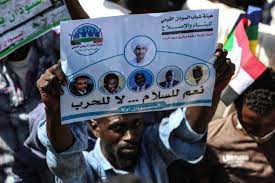Author: Abdelkhalig Shaib
Affiliation: Independent – Freelancer
Organization/Publisher: Arab Reform Initiative
Date/Place: December 15, 2020/Paris, France
Type of Literature: Article
Number of Pages: 13
Keywords: Sudan, Constitution, State-Religion Relationship, Citizenship, Secularism
Brief:
Abdelkhalig Shaib discusses the debate over the relation between religion and state in the Sudanese constitution in light of the Juba and Addis Ababa Peace Agreements. He starts by laying out both agreements’ frameworks and their main clauses and provisions regarding the dilemmatic question of the relation between religion and state. The Juba Peace Agreement addresses the fundamental issues of the Darfur crises and other marginalized regions. It provides complete separation between religion and state and considers citizenship as the basis of rights and duties. While the Juba Peace Agreement underlines citizenship as its main pillar, the Addis Ababa Peace Agreement enhances the separation between religion and state. The author displays a historical background of the evolution of the religion-state dilemma in Sudan’s constitutions since independence. The dispute about religion has been the basis of the relationship between the Muslim-majority North and the Christian-majority in the South. These versions of the constitution passed through different forms, from clearly mentioning Islam as the formal religion or institutionalizing Islamic law, to totally refraining from any reference to Islam or Sharia. He then provides an evaluation of both agreements if they are successful in solving this dilemmatic dichotomy. Although the Juba Peace agreement provides for complete separation between religion and state, it does not mention how this can be institutionally realized. Accordingly, the author suggests that there is a need for a comprehensive framework to understand the main implications and the core of the agreements to grasp the failures of Sudan’s constitutions. He tries to conceptualize the Sudanese model of civil state and how this could be best described in its constitution and institutions. In the Sudanese paradigm, civil state is understood in broader terms, which refers to a state not ruled by religious, military or any higher authority that is not elected under the framework of the social contract. Shaib recommends that a state’s institutions, including civil and military, should follow a legal framework that guarantees its functioning away from loyalty interferences. Moreover, this discussion should be more systematic, in-depth, and encompass the whole Sudanese community since religion is considered central to its national identity. Separation between religion and state is essential for the establishment of the civil state, however, this does not mean separation of religion from society; but, rather, the non-employment of religion in politics to avoid such polarization that led to the North-South conflict.
By: Yomna Süleyman, CIGA Research Assistant




